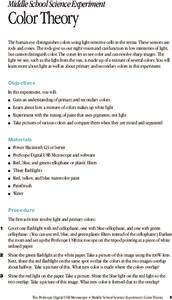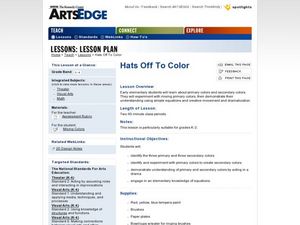National Gallery of Canada
My Treehouse
If you could build your own treehouse, what would it look like? Using a piece of contemporary art as inspiration, learners draw their own treehouses and add geometric and organic shapes. The lesson touches on Visual Thinking Strategies...
Art Institute of Chicago
Color Combinations
Explore color through an examination of pointillism and light. Class members view Georges Seraut's famous painting on a computer, zooming in and out to see the details and effects of the technique. They then cover how light and color are...
Curated OER
Tissue Paper Flowers
Here is a sweet and simple instructional activity that introduces young learners to the three primary colors; red, yellow, and blue. Through a discovery process, youngsters learn how to successfully identify these colors, and the many...
Curated OER
Complementary Superheroes
Students discover the color wheel. In this color lesson, students find the primary colors, secondary colors, and contrasting colors. They look through the designs of super hero logos and create their own using what they know about color.
Curated OER
Color Scheme Acrylic Painting Self-Assessment
Being a good artist means being able to critique your own work. Here young painters will take a short quiz on color schemes in acrylic painting and then reflect on their use of color in a recently completed piece. A great worksheet for...
Curated OER
Color the Snow
Are your teaching in a cold and snowy environment? If so, then try out this fun activity with your class. You mix a variety of colors in large jars to show learners the difference between primary and secondary colors, then let them mix...
Curated OER
Colors, Colors Everywhere
Students mix red, yellow, and blue frosting together to produce secondary colors. Pupils are shown that all colors are made from mixing primary colors of paint together. They discuss the color wheel and spread the "paint" icing on...
Curated OER
Color Theory
Students are able to gain an understanding of primary and secondary colors. They are able to explore about how a mixture of colors makes up white light. Students are able to experiment with the mixing of paint that uses pigments, not...
Oglebay Institute
Post-Impressionism: Pointillism
How can little dots in two colors make a third color? Experiment with pointillism and color mixing with a series of activities. After viewing paintings by Seurat and watching a teacher demonstration, pupils create samples of three...
Curated OER
The Purple Cow
Young scholars read and discuss the poem, The Purple Cow. In this poetry lesson, students discuss the rhyming words in the poem and why this piece of literature is silly or unusual.
Curated OER
Fine Arts
Art Teachers should love this presentation which highlights some of the basic elements of pieces of visual art. Purposes for creating art, art processes, art media, and art subject matter are all topics presented in a colorful way. A lot...
Curated OER
Mixing Colors with Corn Syrup and Food Coloring
Anyone who has worked with small children know that color identification and color mixing can be fun! This simple idea has a lot of potential. It suggests to mix food coloring with corn syrup to provide an opportunity for color mixing...
Curated OER
The Color Wheel
Hand out this nifty resource to make your next lesson on the color wheel a snap. It is a picture of the color wheel alongside a description of primary, secondary, and mixing colors. Great for artists of any age.
Curated OER
Counting Coloring Puzzle
If your kids enjoy color-by-number, they will be excited about this worksheet! Using a color key, they match numbers on a picture of a bee by coloring them the corresponding shade. There is a trick here: although the number 10 is listed...
Curated OER
Color Theory
Sixth graders explore the basics of color mixing with paint by creating secondary and tertiary colors. Individually, 6th graders create their own paintings based on a popular series of sculptures.
Curated OER
Do You Know Your Colors?
Red, yellow, green, and blue are such wonderful colors. Introduce your littlest learners to the color names, where they are commonly found, and how they can be mixed or made. A highly visual presentation that shows its colors.
Curated OER
Color My World
Second graders experiment mixing primary colors to form other colors using frosting.
Curated OER
Color Mixing
Students experiment with primary colored water to mix new colors. They record new colors on a simple data sheet and share opinions on their work.
Curated OER
Color Theory & Using Layers
Students investigate the color wheel theory and incorporate it into simple sketches on their handheld. The importance of the use of layering and the difference between primary, secondary, and tertiary colors is presented in this lesson.
Curated OER
Four Color Map
Learners explore geometry by completing a color puzzle. In this shape identification lesson, students utilize deductive reasoning to complete a Google SketchUp puzzle with trapezoid, triangles and rectangular shapes. Learners complete...
Curated OER
Chromatography Lab
Students discover the components of primary and secondary colors. In this physical science lesson, students create a set up in which water will separate a color into the component colors along a piece of filter paper. Students will then...
Curated OER
Spicy Hot Colors
First graders discover the importance of primary colors by reading a book in class. In this art lesson, 1st graders read the book Spicy Hot Colors, and discuss the three primary colors and the numerous combinations they can make....
Curated OER
What is It? Susie Sees!
Learners explore the five senses. In this cross curriculum five senses lesson, students view an "I Can See Colors" PowerPoint presentation and sort items by color and shape. Learners mix primary color paints to create secondary colors,...
Curated OER
Hats Off to Color
Students investigate primary and secondary colors. In this art lesson, students mix primary paint colors to develop secondary colors. Students identify each color they created.

























